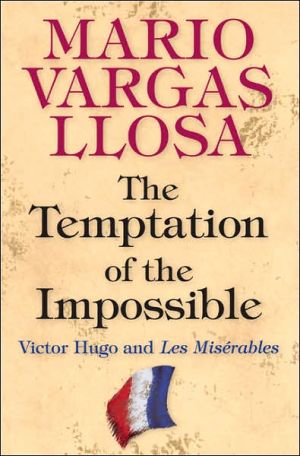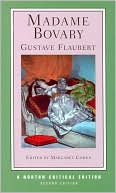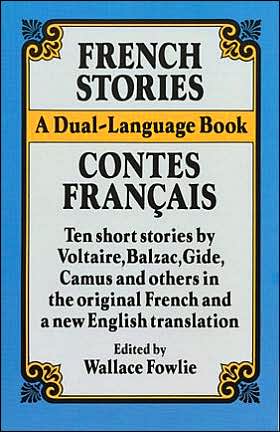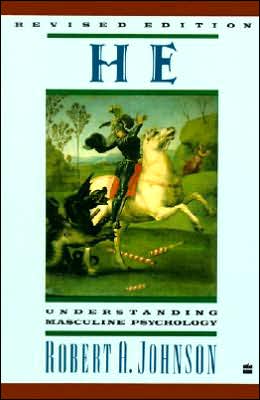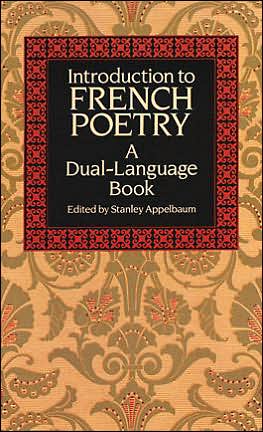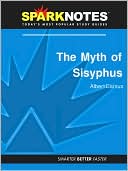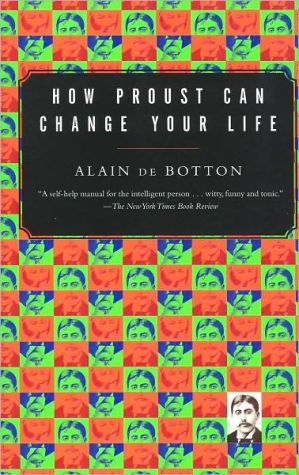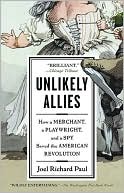The Temptation of the Impossible: Victor Hugo and "Les Miserables"
It was one of the most popular novels of the nineteenth century and Tolstoy called it "the greatest of all novels." Yet today Victor Hugo's Les Misérables is neglected by readers and undervalued by critics. In The Temptation of the Impossible, one of the world's great novelists, Mario Vargas Llosa, helps us to appreciate the incredible ambition, power, and beauty of Hugo's masterpiece and, in the process, presents a humane vision of fiction as an alternative reality that can help us imagine a...
Search in google:
"It is always interesting when a writer of Vargas Llosa's distinction discusses a great novelist, bringing to bear a luminous awareness of the craft of fiction. The Temptation of the Impossible is written with considerable zest, discrimination, and enthusiasm. Raising practical and theoretical points about the art of the novel, Vargas Llosa never loses sight of Hugo's specific achievement. I recommend this book without hesitation."--Victor Brombert, author of Trains of ThoughtThe Complete ReviewAmong the things that most fascinate Vargas Llosa is how very fictional Les Misérables is—in the sense of not being true to reality. . . . Among the best parts are when Vargas Llosa goes at it from a writer's point of view—such as in explaining the necessity and use of the great lengths to which Hugo took this work—but even in professor-mode Vargas Llosa offers many useful tidbits (about Hugo, about the reception of the book, etc.) and opinions.... Even if [Les Misérables] is only a distant memory, Vargas Llosa's look makes one eager to pick it up again.
Acknowledgments xiIntroduction: Victor Hugo, the Ocean 1The Divine Stenographer 11The Dark Vein of Destiny 34The Law of Chance or the Order of Coincidence 34The Irresistible Traps 41The Ambush in the Gorbeau Tenement 43The Barricade at la Chanvrerie 45The Paris Sewers 47Elusive Freedom 52Touchy Monsters 56A Character without Qualities 57The Saint 61The Just Man 65A Puritan World 70The Fanatic 75An Angel with a Dirty Face 80Collective Characters 84The Great Theater of the World 87Adjectives to Describe the Show 89Performance, Beauty, and Life 92Light and Shadow 95Sets 96The Victor at Waterloo 97Human Putrefaction 98Life as Fiction 102Rich, Poor, Leisured, Idle, and Marginal 105Reformist Idealism 110The Just 114A Society Rebuilt 118The Victims: Confinement and Women 120A Source of Social Injustice: The Law 122A Stupid and Cruel Monster 124Civilized Barbarians 131Long Live Death! 132Slow-Motion Progress 134Victor Hugo and the Insurrection of 1832 138From Heaven Above 146The Enumeration of the Infinite 148Attempting the Impossible 154The Total Novel or the Deicidal Impulse 156The Temptation of the Impossible 165Notes 179Index 185
\ Los Angeles Times\ - Benjamin Lytal\ Although books about other books abound, there are very few that actually tell us what it is like to read. The Temptation of the Impossible, Mario Vargas Llosa's book about Victor Hugo's Les Misérables, is one of these rare confessions.\ \ \ \ \ San Francisco Chronicle\ - Robert Hicks\ Novelist Mario Vargas Llosa contributes to the canon with his provoking and insightful study of 19th century French novelist Victor Hugo's Les Misérables in his book-length essay, Temptation of the Impossible....Vargas Llosa's study reaches beyond an analysis of Les Misérables to help define the very essence of the novel and fiction.\ \ \ ForeWord\ - Tim Davis\ Part literary criticism, part biography, and part personal essay, The Temptation of the Impossible is the author's perceptive tribute to Hugo's Les Misérables. For Vargas Llosa ... Hugo's marvelous novel is a brilliant portrayal of 'a world blazing with extreme misfortune, love, courage, happiness, and vile deeds.'... Some literary critics may disagree with his provocative claims regarding the role of fiction in readers' lives, but Vargas Llosa argues so passionately that even dissenting critics will admire his zealous and meticulous reasoning.... For any student of world literature who is interested in an important and hugely readable, one-stop critical analysis of Hugo's canonical novel, Vargas Llosa's book is the perfect destination.\ \ \ \ \ First Things\ - Algis Valiunas\ Vargas Llosa is ideally placed to lead a reconsideration of Victor Hugo.... [He] examines the providential vein in Les Misérables that runs through both individual destinies and the life of nations.\ \ \ \ \ The Age\ - Steve Carroll\ Mario Vargas Llosa, acclaimed novelist, critic and one-time conservative politician, has, in Hugo's epic, found the perfect vehicle for a study that is a combination of literary criticism, general essay and philosophical speculation. He dissects Hugo's style, emphasizing not just his larger-than-life characters, but, more importantly, his narrator—the biggest and most dangerous 'character' in the book of dangerous characters. What makes Hugo's book dangerous is that it just might stir the reader to pursue the ideals of a better world. Llosa, with an eloquent ease that has to be admired, relates this danger to the novel form itself, and how societies—especially repressive regimes of military, religious, left or right persuasion—have distrusted the novel.\ \ \ \ \ Choice\ - C.B. Kerr\ When one distinguished author critiques the masterpiece of another, the result is not always exceptional. But in this case, it is. In this expanded version of lectures he delivered at Oxford in 2004, Vargas Llosa offers both probing insights into the characters, themes, and ultimate significance of Les Misérables and powerful lessons on the art of fiction writing.\ \ \ \ \ Magill's Literary Annual\ - Shawncey Webb\ Vargas Llosa's book is a significant addition to the criticism of Les Misérables and of Hugo as a novelist. Vargas Llosa makes Hugo accessible to the reader as an author who was not fettered by the time period in which he wrote. He also presents valuable insights into the genre of fiction and what 'reality' means in a fictional work. Since Vargas Llosa is himself a highly respected novelist, his book has been particularly welcomed by critics in the field.\ \ \ \ \ Los Angeles TimesAlthough books about other books abound, there are very few that actually tell us what it is like to read. The Temptation of the Impossible, Mario Vargas Llosa's book about Victor Hugo's Les Misérables, is one of these rare confessions.\ — Benjamin Lytal\ \ \ \ \ BooklistVargas Llosa discerns genius in the French novelist's artistic transmutation of . . . leaden terrestrial events into a golden utopian fantasy. Readers who cherish Hugo's powerful novel will value this insightful study.\ \ \ \ \ San Francisco ChronicleNovelist Mario Vargas Llosa contributes to the canon with his provoking and insightful study of 19th century French novelist Victor Hugo's Les Misérables in his book-length essay, Temptation of the Impossible....Vargas Llosa's study reaches beyond an analysis of Les Misérables to help define the very essence of the novel and fiction.\ — Robert Hicks\ \ \ \ \ ForeWordPart literary criticism, part biography, and part personal essay, The Temptation of the Impossible is the author's perceptive tribute to Hugo's Les Misérables. For Vargas Llosa ... Hugo's marvelous novel is a brilliant portrayal of 'a world blazing with extreme misfortune, love, courage, happiness, and vile deeds.'... Some literary critics may disagree with his provocative claims regarding the role of fiction in readers' lives, but Vargas Llosa argues so passionately that even dissenting critics will admire his zealous and meticulous reasoning.... For any student of world literature who is interested in an important and hugely readable, one-stop critical analysis of Hugo's canonical novel, Vargas Llosa's book is the perfect destination.\ — Tim Davis\ \ \ \ \ First ThingsVargas Llosa is ideally placed to lead a reconsideration of Victor Hugo.... [He] examines the providential vein in Les Misérables that runs through both individual destinies and the life of nations.\ — Algis Valiunas\ \ \ \ \ ChoiceWhen one distinguished author critiques the masterpiece of another, the result is not always exceptional. But in this case, it is. In this expanded version of lectures he delivered at Oxford in 2004, Vargas Llosa offers both probing insights into the characters, themes, and ultimate significance of Les Misérables and powerful lessons on the art of fiction writing.\ — C.B. Kerr\ \ \ \ \ Magill's Literary AnnualVargas Llosa's book is a significant addition to the criticism of Les Misérables and of Hugo as a novelist. Vargas Llosa makes Hugo accessible to the reader as an author who was not fettered by the time period in which he wrote. He also presents valuable insights into the genre of fiction and what 'reality' means in a fictional work. Since Vargas Llosa is himself a highly respected novelist, his book has been particularly welcomed by critics in the field.\ — Shawncey Webb\ \ \ \ \ The Complete ReviewAmong the things that most fascinate Vargas Llosa is how very fictional Les Misérables is—in the sense of not being true to reality. . . . Among the best parts are when Vargas Llosa goes at it from a writer's point of view—such as in explaining the necessity and use of the great lengths to which Hugo took this work—but even in professor-mode Vargas Llosa offers many useful tidbits (about Hugo, about the reception of the book, etc.) and opinions.... Even if [Les Misérables] is only a distant memory, Vargas Llosa's look makes one eager to pick it up again.\ \ \ \ \ The AgeMario Vargas Llosa, acclaimed novelist, critic and one-time conservative politician, has, in Hugo's epic, found the perfect vehicle for a study that is a combination of literary criticism, general essay and philosophical speculation. He dissects Hugo's style, emphasizing not just his larger-than-life characters, but, more importantly, his narrator—the biggest and most dangerous 'character' in the book of dangerous characters. What makes Hugo's book dangerous is that it just might stir the reader to pursue the ideals of a better world. Llosa, with an eloquent ease that has to be admired, relates this danger to the novel form itself, and how societies—especially repressive regimes of military, religious, left or right persuasion—have distrusted the novel.\ — Steve Carroll\ \
